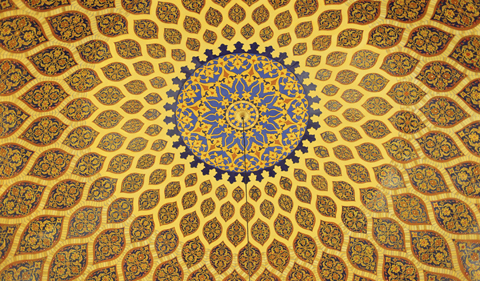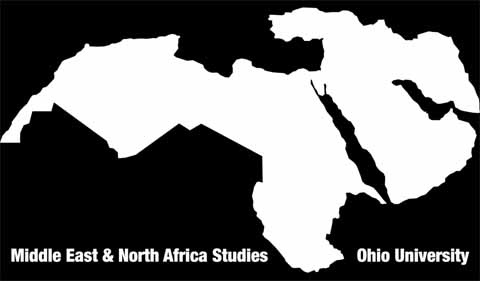The Ohio University Class of 2018 featured the first students graduating with a Middle East and North Africa Studies Certificate.
Approved in Spring 2017, the certificate program provides undergraduate students from across campus with a focused interdisciplinary combination of courses on the history and contemporary politics of the region. In its first year, more than 15 students elected to add the certificate to their program of study.
The inaugural class of the OHIO MENA Studies Certificate program included seven undergraduates, drawn from four majors spread across three colleges. Each student completed no less than five courses in at least three departments, all of which focused on some aspect of the Middle East and North Africa region.
Five of the seven graduates also completed at least one other certificate or minor in Islamic Studies, War & Peace, Social Media, Writing, History, or Spanish. While there is no language requirement for the MENA Studies certificate, five of the seven graduates completed two years of Arabic language courses at Ohio University.
Diverse Courses
The MENA Studies Certificate program draws from over 15 courses regularly offered by a combination of five departments from across Ohio University. Examples of courses offered during the 2017-18 academic year include:
- HIST 3371: Middle East History, 1500-Present
- ANTH 3820: Cultures of the Mediterranean
- ARAB 1120: Elementary Arabic II
- CLWR 3330: Introduction to Islam
- POLS 4902: Law and Colonialism
- MDIA 4170: Media and the Muslim World
Engaging Events
While the bulk of the MENA Studies program’s efforts are focused on the certificate, the program also organizes a range of events designed to complement in-class education and speak to contemporary debates about the region. Examples of events organized during the 2017-18 academic year include the “Travel Ban” film series featuring films from/on countries included in the Trump Administration’s travel ban, a lecture by University of California Santa Barbara sociologist Dr. Lisa Hajjar on “Torture and the U.S. War on Terror in Historical Context,” and an exhibition on “Material Histories: Cultures of Resistance” (Fall 2017).
Students React to Their Experience in the MENA Studies Program
“The MENA studies certificate and its classes have been really helpful to my understanding of the world we live in,” said Michael G. Mangan, B.A. in Political Science and History. “The core requirement (HIST 3371: Middle East History, 1500 to Present) especially helped me develop a framework for critically evaluating and analyzing the Middle East and North Africa within a global comparative context. Particularly important for me was the attention on colonial and postcolonial structures that continue to have implications for democratization and human rights in the region as well as the liberal world order. The certificate really helped me to realize how the Middle East and North Africa’s history and politics were not isolated from, but rather integral to, the global system we live in.”
Annalycia Liston-Beck, B.A. in Political Science, said she “really enjoyed the MENA Studies Certificate program because it was a great way to show my interest in and learn about the Middle East and North Africa. Lots of employers do not ask for my transcripts, so without this certificate title on my resume, I feel I would not look as qualified for the jobs I’m most interested in. The region is very important for U.S. and international politics, and so I felt it was important to learn about its history, contemporary politics, and one of its languages (Arabic). These courses also allowed me to meet some of the people that have become my closest and longest-term friends.”
Ben Ekelman, B.A. in Political Science and History, said the program and its courses were “intellectually significant for many reasons.” “The courses I took to complete the certificate will always be something I can reference while at family gatherings or at the workplace should the topic of the Middle East be mentioned. The certificate allowed me to understand much about the region, including its history,” he said.
The MENA Certificate gave Karen Renee, B.A. in World Religions, invaluable insight into the history, politics, cultures, and gender dynamics of the region.”I often felt that I needed to go beyond the frequently simplified and one-dimensional image that is presented in our media to form a more nuanced understanding. This is especially important in this current moment given the humanitarian crises we are witnessing in places such as Syria, Palestine, Iraq, and Yemen,” Renee said. “These crises raise many questions that demand answers, so learning the history of the region is crucial for understanding what is happening there today. The MENA Studies program has also encouraged me to challenge and expand my own worldview, which I feel is essential not only for academic success but also for my personal growth in an increasingly diverse world.”
The MENA Studies Certificate exposed Margaret H. Storrs, B.A. in World Religions, to diverse courses and areas of study that she would likely have not have experienced otherwise. “This complement to my general and major education has made me a more competitive candidate in pursuing my graduate school goals and professional aspirations,” Storrs said. “The most significant benefits of the MENA Studies Certificate have been personal. I have developed strong critical thinking skills that have improved the way in which I evaluate the history and challenges facing the region today, particularly the ways in which the United States is involved. This has helped me challenge the rampant claims in Western mainstream media that the religion of Islam or the culture of Arabs are the root-causes of conflicts in the MENA region today. “This seems like a basic and obvious revelation,” she continued. “However, by taking classes I have both realized how pervasive such rhetoric is the United States, how it has unwittingly shaped my perception of the region, and how I can challenge both. This kind of growth has not made me a better person, a better American, and also a better global citizen.
More Information
Students, faculty, and advisers interested in learning more about the Middle East and North Africa Studies Certificate should contact the coordinator of the program, Dr. Ziad Abu-Rish at abuz@ohio.edu.
- Enroll in and complete the MENA Studies Certificate.
- See the MENA events series for Fall 2018 .
- See Fall 2018 courses that count toward the Middle East & North Africa Studies certificate.




















Comments